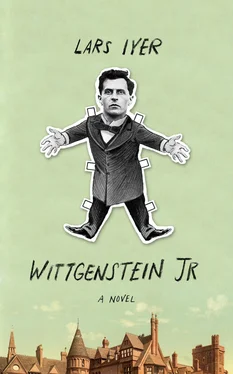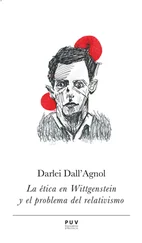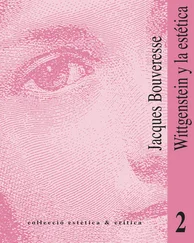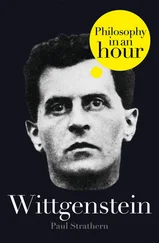The effort of thinking. Wittgenstein stands silently in the corner of the room. He grasps his head. He shakes his head. Sweat streams from his face.
Divine help: that’s what he needs, he says. We cannot think by ourselves, no more than we can create ourselves.
Wittgenstein asks a general question, and waits for a reply.
Silence.
He asks his question again, slightly rephrasing it.
More silence.
He asks it for a third time.
Still more silence.
Okulu ventures a timorous reply. Wittgenstein waves it aside.
Doyle says something. Not good enough! Wittgenstein says.
Silence, stretching out. Silence, the equivalent in time to Death Valley. To the Russian steppe. To the surface of the moon … Oh God, someone say something!
Wittgenstein’s silence, his eyes closed, like a man already dead. How old he seems! As though he’d read everything and forgotten everything. As though he’d lived not one but several lives.
His silence. He wants to carry us down, as into the depths of the deepest lake. Like the concrete boots that drag down a body. Down he takes us — into the green depths. He wants to drown us in his depths. But we do not want to be drowned … We are too young to be drowned …
A walk on the Backs, Wittgenstein walking ahead.
We discuss our most recent hangovers. Mulberry lay in bed for three days. Doyle hallucinated giant spiders dropping from the ceiling. Titmuss heard his name being called by the trees and the flowers. Benedict Kirwin caught the clap. Ede says he’s still drunk from last weekend. Guthrie’s never had a hangover, he says, since he’s never stopped drinking. (He’s drinking now, sipping from his hip flask.)
Wittgenstein stops. Turns to us.
Five years of philosophy: that’s all any of us is good for, he says.
It was all his brother was good for, he says. And now it is five years since his brother’s death. Since his brother’s suicide . Five years in which he, following his brother’s example, has tried to think …
Sometimes he wishes he had never begun his studies in logic. His studies in philosophy! Sometimes, he longs for it all to have been a dream. For his logical studies to have been a kind of fever …
To wake up, with his mother’s hand on his brow. To wake up, with his brother beside him, in the attic room where they used to sleep — his brother who had likewise never begun his mathematical studies, his logical studies; his brother, who had never set out for Oxford, as Wittgenstein had never set out for Cambridge … To wake up, and chatter with his brother about the trees they would climb that day, or the pits they would dig, or the rivers they would ford, or the theatrical sketches they would put on, or the songs they would sing together at the piano, or the dens they would build in the woods, or the birds that would sing above them. To wake up, and speak of anything but their studies, anything but mathematics, anything but logic.
The Maypole , after class.
DOYLE: Have you heard? They’ve had to remove Scroggins’s bladder.
EDE: What! Why?
DOYLE: Ketamine damage. After the party.
A shocked pause.
Ede googles bladder .
EDE (reading): The organ that collects urine excreted by the kidneys before disposal by urination . Can you live without a bladder, do you think?
Ede googles living without a bladder .
EDE: They have to find some other way for you to piss. A colostomy bag, or something.
Miserable, we all agree. A bladder is really something you’d miss.
A don in our class; one of the older faculty members. Slippers and blazer, and a pipe poking out of his pocket — do people still smoke pipes? Mug of tea in his hand. How cozy he looks!
Wittgenstein greets him courteously. The don says he’d prefer not to sit on one of the classroom chairs. Doyle goes to get an armchair from the common room, and we move our chairs to make space for it when he returns. The don sits and pulls out a notebook.
Has the don come to steal ideas? To perform some kind of sabotage ? Is the don letting Wittgenstein know he is being watched? Is the don an infiltrator? A spy ? Is he preparing a Wittgenstein dossier for the authorities?
The don takes notes as Wittgenstein speaks. Meticulous notes. And when the lecture finishes, the don stands to leave. Wittgenstein, catching his eye, gives a little bow. The don bows back.
Afterwards, we walk along the Backs.
The Cambridge trap is closing around him, Wittgenstein says. Good! Let it close! The noose of Cambridge is being tightened round his neck. Good! Let them kick away the stool!
The dons are coming for him, he says. Of course they are! They can sense what he is. They know he comes to judge Cambridge. And they know their own time is passing. The time of the don is no more.
• • •
Once, the dons were part of something, Wittgenstein says. Part of the genius of Cambridge, like the ivy on the bridges, like the boathouses along the river. Once, the dons carried the whole history of England on their shoulders, in their processions and their ceremonies — soaring patriotism, a sense of moral purpose, eccentricity, unworldliness, diffidence: resting on the shoulders of the dons.
All of England was once a lawn , Wittgenstein says. The whole of the country, with its uplands and lowlands, with its suburbs and towns, was once the quintessence of lawn .
The English lawn ran right into the Houses of Parliament. It ran right into Buckingham Palace, into Whitehall and the Law Courts. And into the media empires and the great publishing companies.
The English lawn rolled up to middle-class houses, just as it rolled up to aristocratic mansions. And even if it was halted by working-class concrete, it ran nonetheless through the heads of the working classes, just as it ran through the heads of the middle classes and the upper classes — a timeless idea of England.
England has always imagined itself in terms of rural idyll , Wittgenstein says. Of the fields’ patchwork, all openness and breadth. Of the village green, with its war memorial. Of the parish cemetery, covered with elms. Of pretty little wildernesses, marked off from working land. Of ornamental lawns, close-clipped victories over age. Of informal lawns, with deer parks and temples. Of panoramic lawns, divided only by ha-has. Of landscaped lawns, framing the great country houses …
It was for the green peace of meadow and hedgerow that English soldiers defended their country from foreign invaders, Wittgenstein says. And it was for the rural idyll they went forth to conquer the world. Wasn’t it a simulacrum of the English lawn that they watered in the hill stations of India? Didn’t they try to roll out the English lawn in the white mountains of Kenya?
And it was in the name of the English lawn that the enemy within was kept down, Wittgenstein says. The Peasants’ Revolt was crushed for seeking equality on the English lawn. The Diggers were transported for declaring that the English lawn was part of the commons. And the new industrialists sent their sons to become good little gentlemen in the public schools of the English lawn.
But never was the English lawn so lush as in the great universities of England! , Wittgenstein says. Old expanses of lawn, strewn with meadowsweet and buttercups in high summer. Crocuses blooming in spring. Students picnicking, all white-flannelled elegance.
And the old dons, of the great universities of England —the English lawn ran through their hearts, Wittgenstein says. The old dons lived out their lives on the English lawn. They sipped warm beer and watched cricket on the English lawn. They munched crustless sandwiches at garden parties on the English lawn. And one day, they were laid to rest in the English lawn.
Читать дальше












